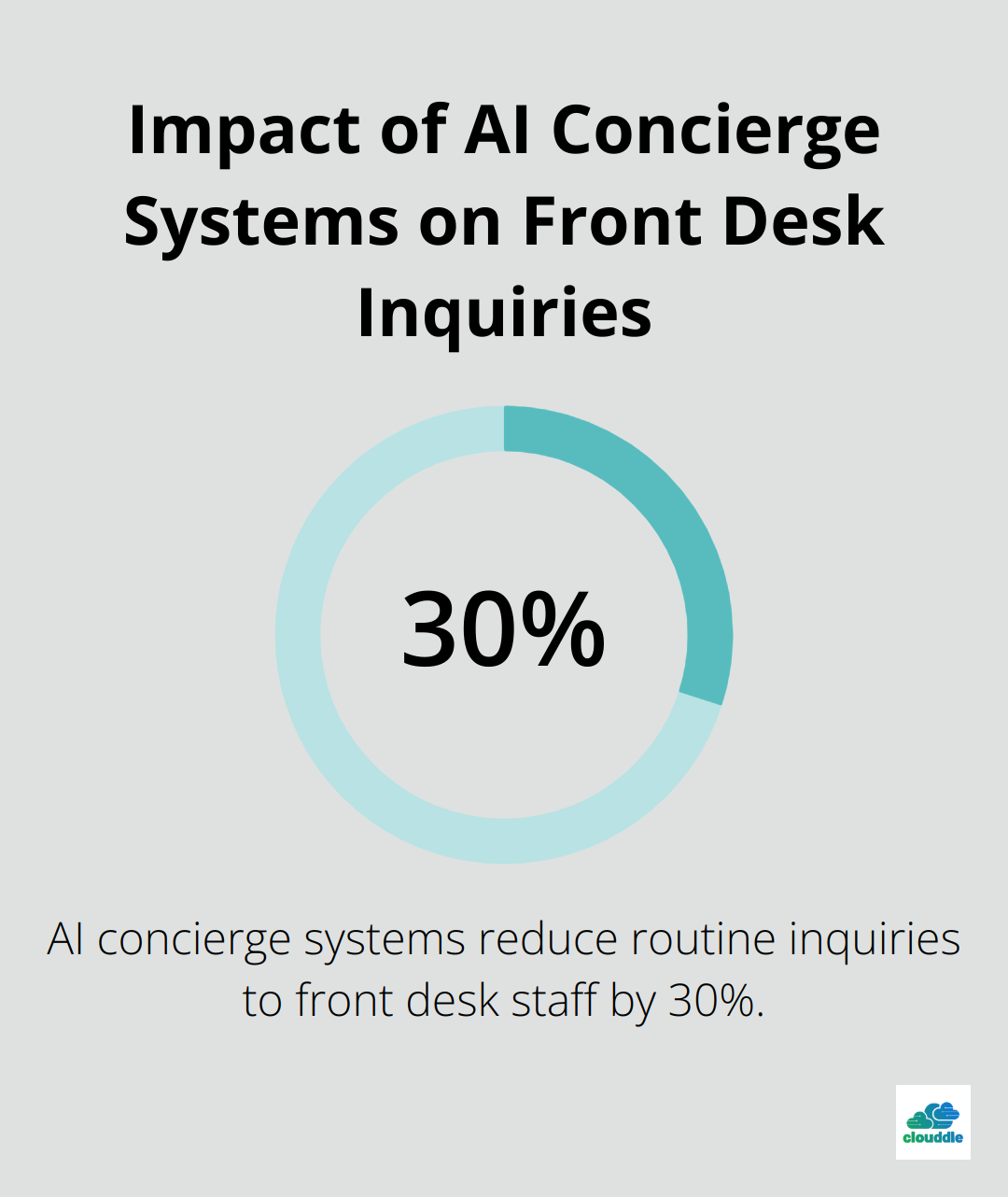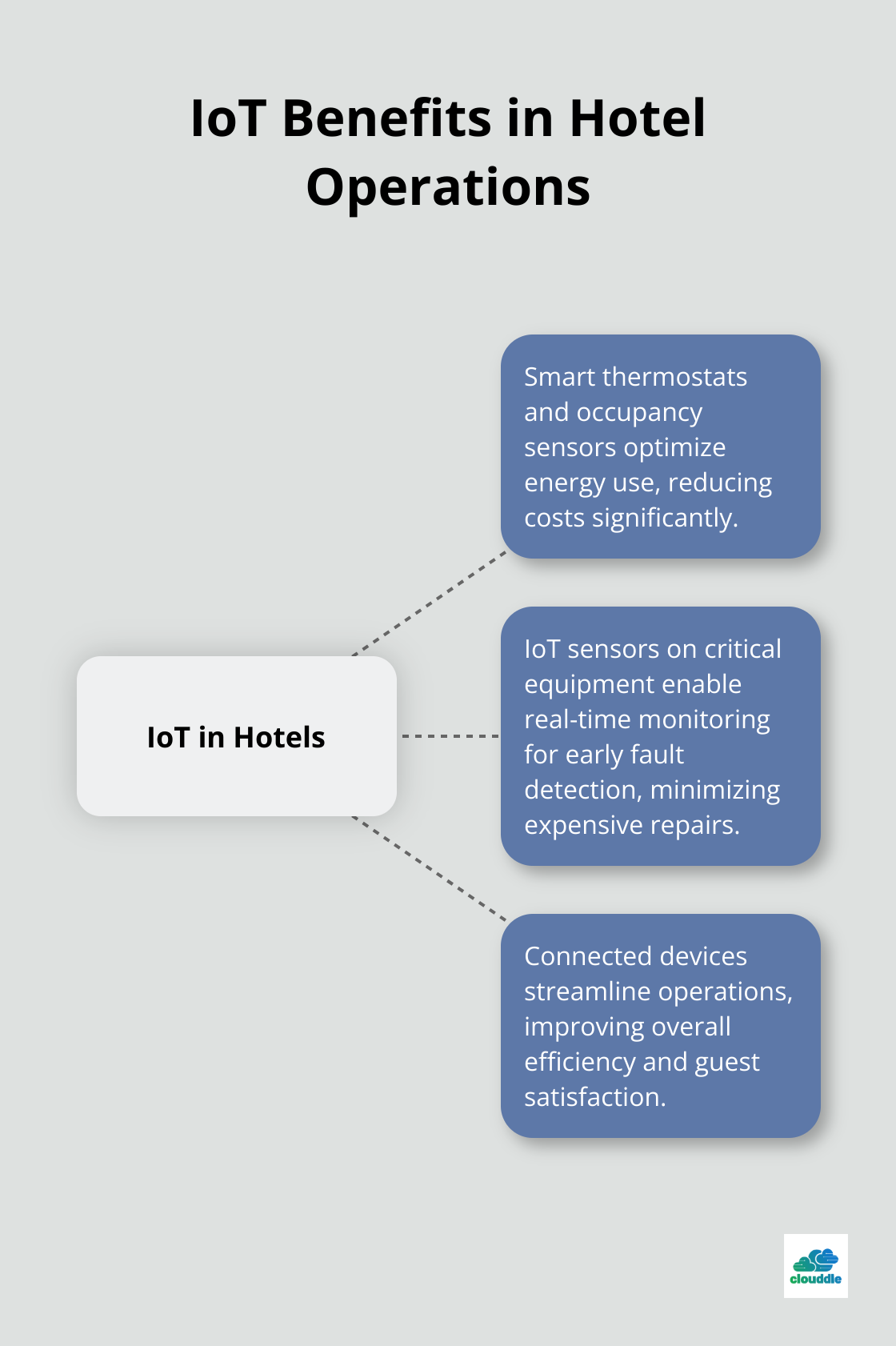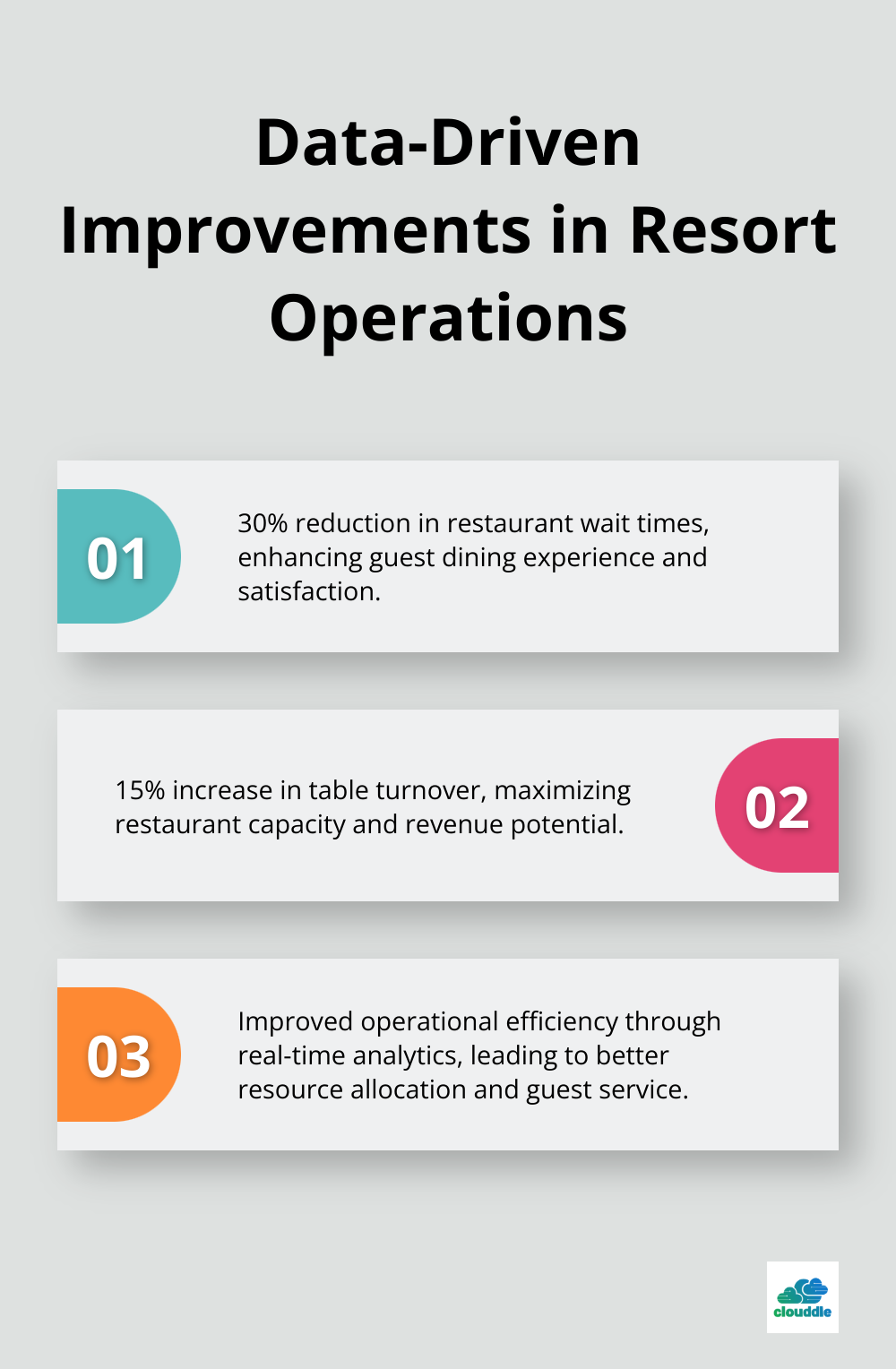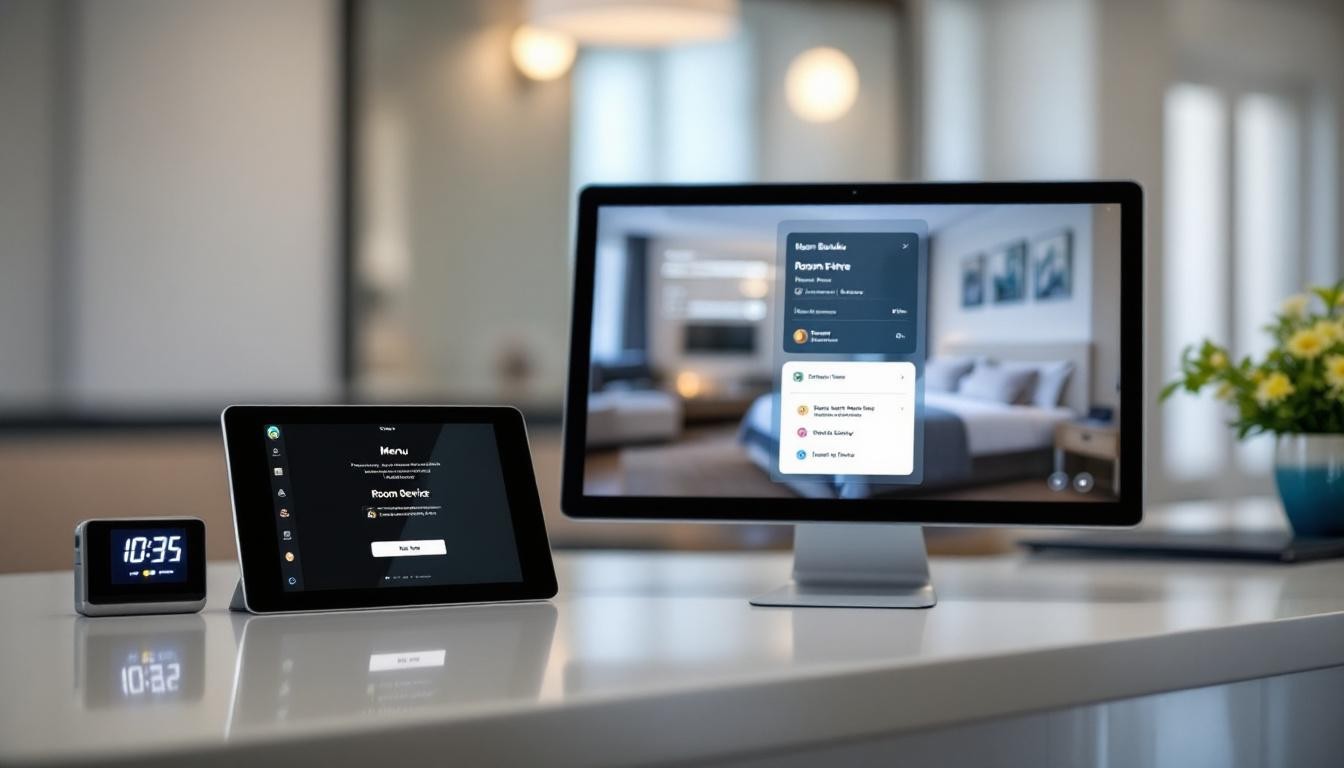The importance of IT in the hospitality industry can’t be overstated. Technology is reshaping how hotels operate and interact with guests.
At Clouddle, we’ve seen firsthand how IT solutions transform every aspect of the hospitality sector, from check-in to checkout and beyond.
In this post, we’ll explore how technology enhances guest experiences, streamlines operations, and empowers data-driven decision-making in hotels.
How Technology Enhances Guest Experience
The hospitality industry has embraced technology as a necessity, not a luxury. Let’s explore how hotels use cutting-edge solutions to elevate guest experiences from ordinary to extraordinary.
Mobile Check-In: A Seamless Arrival
Long queues at the front desk are a thing of the past. Mobile check-in has revolutionized the arrival process. A global hotel brand implemented mobile check-in at 60% of its properties and saw guest satisfaction scores rise by 18% within the first year. This technology reduces wait times and allows guests to bypass the front desk entirely, heading straight to their rooms upon arrival.
Smart Rooms: Personalized Comfort at Your Fingertips
Smart room technology takes personalization to new heights. Guests can now walk into a room where the temperature, lighting, and even TV channels are set to their preferences. These systems not only enhance guest comfort but also contribute to energy efficiency.
AI Concierges: 24/7 Assistance on Demand
AI-powered chatbots and virtual concierges transform guest services. Hotels implementing AI concierge systems report 30 percent reductions in routine inquiries to front desk staff, allowing team members to focus on more complex guest needs.

Personalized Entertainment: Streaming at Your Service
Hotels now offer in-room entertainment systems that integrate with popular streaming services. Guests can log in to their personal accounts and enjoy their favorite shows and movies, just like at home. This personalized touch enhances the in-room experience and keeps guests entertained during their stay.
Virtual Reality: Explore Before You Arrive
Some hotels have started to use virtual reality (VR) technology to offer immersive previews of their facilities. Potential guests can take virtual tours of rooms, restaurants, and amenities before booking. This technology helps set accurate expectations and increases guest satisfaction upon arrival.
The implementation of these technologies doesn’t just meet guest expectations-it exceeds them. Hotels that embrace these innovations see higher satisfaction rates, increased loyalty, and a competitive edge in a crowded market. As we move forward, the possibilities for enhancing guest experiences through technology continue to expand, paving the way for even more exciting developments in hotel operations and management.
How IT Streamlines Hotel Operations
The hospitality industry thrives on efficiency, and modern IT solutions have transformed hotel management from booking to maintenance. Let’s explore the significant impact of these technologies.
Cloud-Based Property Management Systems
Cloud-based Property Management Systems (PMS) have revolutionized hotel operations. These systems integrate booking, check-in, housekeeping, and billing into one seamless platform. A study revealed significant improvements in operational efficiency, with check-in processing times decreasing from 3.3 to 2.7 minutes.
A mid-sized hotel chain implemented a cloud-based PMS and experienced remarkable results. This improvement allowed staff to focus more on guest interactions, which led to higher satisfaction scores.
Revenue Management and Dynamic Pricing
AI and machine learning power automated revenue management systems to optimize pricing strategies. These systems analyze market demand, competitor pricing, and historical data to set the most profitable room rates in real-time.
A luxury resort in Hawaii (known for its pristine beaches and world-class amenities) implemented an AI-driven revenue management system. The system’s ability to adjust prices based on real-time demand during peak seasons proved particularly effective.
IoT for Energy Management and Maintenance
Internet of Things (IoT) devices transform how hotels manage energy consumption and maintenance. Smart thermostats, occupancy sensors, and connected appliances work together to optimize energy use and predict maintenance needs.
A large hotel in New York City installed IoT-enabled energy management systems in all its rooms. The system automatically adjusted room temperatures based on occupancy, which significantly reduced wasted energy.
For maintenance, IoT sensors on critical equipment like elevators and HVAC systems can help in real-time monitoring for early fault detection, reducing the need for expensive repairs in emergency situations.

Automated Inventory Management
Hotels now use automated inventory management systems to track supplies, from linens to toiletries. These systems alert staff when stock runs low and can even place orders automatically.
A boutique hotel chain implemented an automated inventory management system. The system’s ability to predict usage patterns based on occupancy rates and seasonal trends proved particularly valuable.
Staff Communication and Task Management
Modern hotels use digital platforms for staff communication and task management. These systems allow for real-time updates, task assignments, and progress tracking.
A resort in California implemented a digital staff communication platform. The system also improved interdepartmental communication, leading to more efficient operations overall.
As we move forward, the integration of these IT solutions with robust network infrastructure becomes increasingly important. This is where solutions like Network as a Service (NaaS) come into play, providing the necessary backbone for these advanced technologies to function seamlessly. The next section will explore how data analytics further enhances decision-making in the hospitality industry.
Data-Driven Decisions in Hospitality
Data is the new currency in the hospitality industry. Hotels that leverage data analytics gain a significant competitive advantage, making informed decisions that boost revenue and guest satisfaction. This chapter explores how hotels transform their operations and marketing strategies through data.
Personalized Marketing Through Guest Preferences
Hotels now collect extensive data on guest preferences, from room types to dining choices. This information powers highly targeted marketing campaigns. A luxury hotel chain in Asia implemented a data-driven marketing strategy and saw a 25% increase in repeat bookings within six months.
The challenge lies in using this data responsibly. Hotels must strike a balance between personalization and privacy concerns. Transparent data policies and opt-in programs build trust with guests while allowing hotels to deliver tailored experiences.
Real-Time Analytics for Operational Excellence
Real-time analytics tools provide instant insights into hotel operations. A growing number of hotels are using real-time sales dashboards to track their performance and adjust strategies proactively-moving from reactive to proactive management.
A resort in Florida (known for its beautiful beaches and world-class amenities) used real-time analytics to optimize its restaurant operations. The analysis of peak dining times and guest preferences led to a 30% reduction in wait times and a 15% increase in table turnover.

Predictive Analytics for Demand Forecasting
Predictive analytics revolutionizes how hotels forecast demand and optimize staffing. These tools enhance demand forecasting and staffing strategies, leading to better resource allocation and improved operational efficiency.
A mid-size hotel in New York City implemented a predictive analytics system for staffing. The result? A 20% reduction in labor costs without compromising service quality. The system accurately predicted slow periods, which allowed management to adjust staff schedules accordingly.
Predictive analytics also helps hotels capitalize on high-demand periods. A beach resort used predictive tools to anticipate a surge in bookings due to a local festival. They adjusted their pricing strategy and increased revenue by 35% compared to the previous year’s event.
Data Security and Privacy
As hotels collect more data, the importance of robust security measures increases. Hotels must implement strong encryption, access controls, and regular security audits to protect guest information.
A major hotel chain (with properties across North America) invested in advanced data security measures. This investment not only protected guest data but also increased guest trust, leading to a 10% increase in loyalty program sign-ups.
The power of data in hospitality is undeniable. Hotels that embrace these analytical tools position themselves for success in an increasingly competitive market. The integration of AI and machine learning with these data systems promises even more sophisticated insights and decision-making capabilities in the future.
Wrapping Up
Technology has revolutionized the hospitality industry. From mobile check-ins to AI concierges, hotels now offer personalized experiences that exceed guest expectations. Behind the scenes, cloud-based systems and IoT devices have streamlined operations, reducing costs and improving efficiency.
Data analytics empowers hotels to make informed decisions. Real-time insights enable proactive management, while predictive analytics optimize pricing and staffing. The importance of IT in the hospitality industry cannot be overstated, as it transforms every aspect of hotel operations.
The future of hospitality promises even more exciting technological advancements. Hotels must navigate data privacy concerns and choose solutions with the best return on investment. Clouddle offers cutting-edge technology solutions that address these challenges, allowing hotels to stay competitive in the digital landscape.


